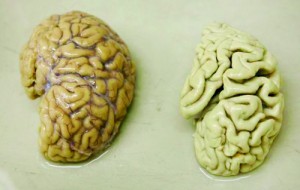Sunday Times 2
Study paves way for simple blood test to predict Alzheimer’s
View(s):LONDON (Reuters) – British scientists have identified a set of 10 proteins in the blood that can predict the onset of Alzheimer’s and call this an important step towards developing a test for the incurable brain-wasting disease.
Such a test could initially be used to select patients for clinical trials of experimental treatments being developed to try to halt progression of Alzheimer’s, the researchers said, and may one day move into routine use in doctors’ clinics.

One hemisphere of a healthy brain (L) is pictured next to one hemisphere of a brain of a person suffering from Alzheimer disease (Reuters)
“Alzheimer’s begins to affect the brain many years before patients are diagnosed (and) many of our drug trials fail because by the time patients are given the drugs the brain has already been too severely affected,” said Simon Lovestone of Oxford University, who led this work from King’s College London.
“A simple blood test could help us identify patients at a much earlier stage to take part in new trials and hopefully develop treatments,” he said.
Alzheimer’s is the most common form of dementia, a brain-wasting disease which in 2010 was estimated to be costing the world $604 billion a year. The fatal disease affects 44 million people worldwide, with the number set to triple by 2050, the campaign group Alzheimer’s Disease International says.
For this study, published in the journal Alzheimer’s & Dementia, Lovestone’s team used blood samples from 1,148 people – 476 with Alzheimer’s, 220 with mild cognitive impairment and 452 elderly controls without dementia. They were analysed for 26 proteins previously found to be linked with Alzheimer’s.
The team found 16 of these 26 proteins to be strongly associated with brain shrinkage in either MCI or Alzheimer’s and then ran a second series of tests to see which of these could predict which patients would progress from MCI to Alzheimer’s.
With this second series, they found a combination of 10 proteins capable of predicting with 87 percent accuracy whether people with MCI would develop Alzheimer’s disease within a year. Experts in the field welcomed the results but said they should be replicated in larger studies before an Alzheimer’s blood test could be rolled out for use in doctors’ clinics.

